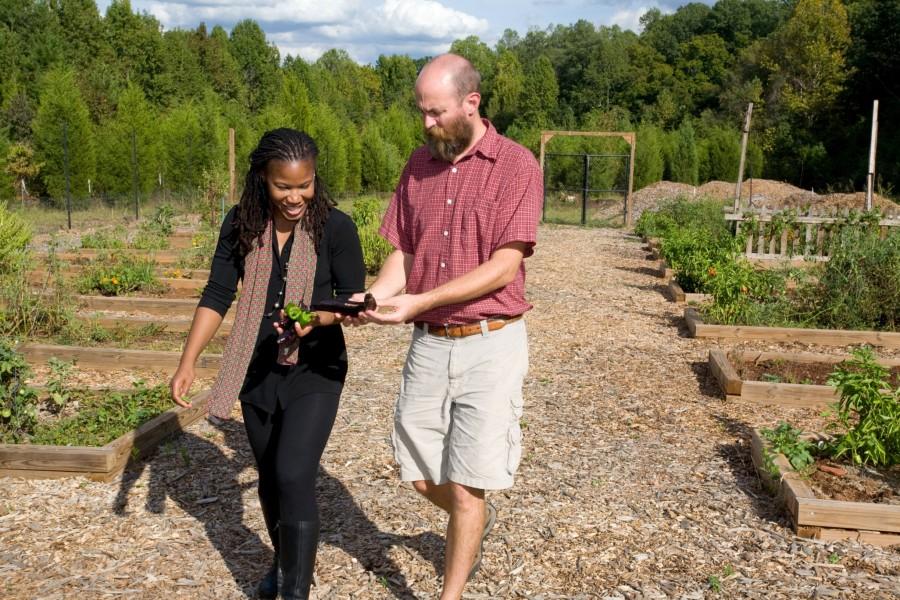On Sept. 28, Majora Carter, a self-described environmental justice advocate and economic solutions maven, inaugurated the 2010-2011 Bryan Series at downtown Greensboro’s War Memorial Auditorium.
In addition to founding Sustainable South Bronx, a nonprofit, environmental-justice solutions corporation, and acting as president of her business The Majora Carter Group, LLC, Carter also co-hosts “The Green” on The Sundance Channel and hosts a public radio series called “The Promised Land.”
Yet, in spite of the diversity in Carter’s ventures, they share a common theme: devotion to environmentally sustainable efforts and solutions.
Hours before her downtown speech, Carter sat down to answer questions with Guilford students and faculty in the Gallery of Founders Hall.
Carter shared her plans for developing a national brand of local produce, which she hopes would both provide opportunities for micro-agribusinesses and create community awareness about eating local, fresh food.
She also spoke of the possibility of turning abandoned, rundown urban buildings into indoor growing facilities in the hearts of a big cities.
“I’m always thinking of ways to create happy, healthy communities and building the capacity for folks to focus on (community) development,” said Carter. “I believe you shouldn’t have to leave your neighborhood to live in a better one.”
That evening, President and Professor of Political Science Kent Chabotar opened the 2010-2011 Bryan Series by introducing its “Sustaining Community” theme. After providing a brief summary of her accomplishments, he welcomed Carter stating, “She has a provocative vision.”
Before Carter began her speech, she asked for the house lights to be turned up and for members of the audience to stand up, turn around, and hug the person beside them; an icebreaker devoted to the building of the Greensboro and Guilford community.
Startled at seeing the size of the crowd Carter said, “My greatest fear is to look out and not see anyone. I’m always afraid no one will show for these things.”
She then launched into her presentation with a history of her background, including pictures of her family and neighborhood.
According to Carter, it all started 10 years ago.
Carter related how when walking her dog, she found herself at an abandoned, waterfront dump in her Bronx neighborhood. She had recently and reluctantly moved back to her old neighborhood after finishing college.
“I always knew there was a Bronx River; I had seen it on maps, but I didn’t know where it was,” said Carter.
At that time, the Bronx Hunts Point neighborhood was the repository for most of New York City’s garbage and sewer treatment. Economic development in this area of Brooklyn had become nearly impossible because loans were rarely available for anyone who dared apply.
Although Carter had no experience in environmental justice, having studied film in college, she knew she had to take action.
“It’s about love and knowing you have something to give,” Carter said. “When I started, I talked to a lot of people, because I didn’t know who I shouldn’t talk to. I just didn’t know any better.”
Carter immediately filled out federal grant paperwork and was rewarded with enough money to turn the former trash dump into a lush, green community park. The most impressive part of her plan was the jobs that it created for a neighborhood ravaged with unemployment and welfare recipients.
Dubbed “green-collar” jobs, they provided the means for training to an eager workforce.
Since the first move toward adding green spaces to the Bronx, Carter has laid out plans and secured additional funding to create a complete Bronx Greenway initiative.
The Majora Carter Company currently focuses on green roof systems in the Bronx and is partnering with Brad Pitt’s Make it Right New Orleans. Carter also has a contract with Elizabeth City State University’s Wetland Restoration Program to develop plans for managing the impact of rising sea-levels and drainage problems.
Carter’s campaign for a national “green-jobs” project, called Home Town Security Corps, was met with hearty applause from the War Memorial audience.
Her vision is to continue training people for “jobs with dignity” while improving the places they live. Her initiative would continue to focus on improving the micro-environment of a community and putting its residents to work doing the work, not importing labor.
“It’s time to understand that we can build a monument to the hope we deserve,” Carter said.
“I didn’t know much about Carter before the event, but I’m really glad I attended,” said senior Sarah Puralewski. “There are so many natural resources we could be using to help bring jobs to people who need work.”
“The thing that impressed me the most about Carter was her method of tying together both what is good for people economically and what is good for the environment,” said environmental studies major Ellee Stapleton. “Her solutions are very practical. She isn’t the sort of person who seems idealistic; rather she works to create concrete jobs that can help revitalize poorer communities.”
As the first speaker of this year’s Bryan Series, Carter’s message of environmental preservation, equality for humanity, and hope for the future of sustainability efforts provided an appropriate introduction to Guilford’s “Green and Beyond” themed year.
Junior and environmental studies major Courtney Mandeville identified other strengths in her presentation.
“The details of her presentations did not stand out to me as much as the fact that she is an amazing example of how a moral compass, grassroots organizing, and determination can help people realize their own power to create positive change,” Mandeville said.

